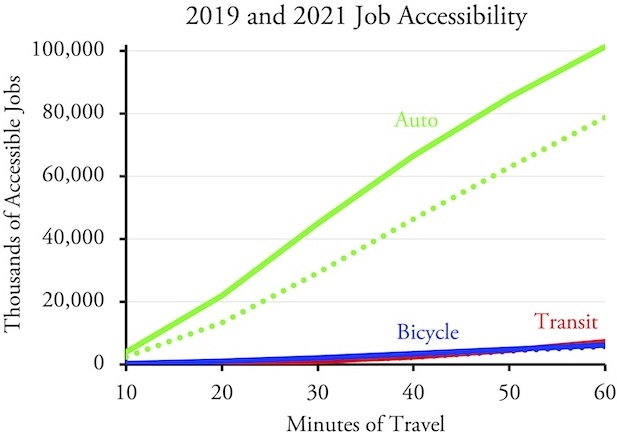The Benefits of Congestion Relief
The Antiplanner has an excellent post that deserves its own dedicated post over here because it gets at what's wrong with one of the most pernicious fallacies regarding highway congestion relief. Key excerpts (bold highlights mine):
"Data published by the University of Minnesota Accessibility Observatory a few months ago reveals some of the benefits of congestion relief that resulted from the COVID pandemic. I’ve used 2019 data in the past to show that residents of U.S. urban areas can reach far more jobs in a 20-minute auto drive than a 60-minute transit trip. The latest data for 2021 reveal that the number of jobs reachable by transit or bicycle was about 9 percent greater in 2021 than 2019, but the number reachable by a 20-minute auto drive was 66 percent greater.
On average, over 50 urban areas and for trips of 10 to 60 minutes, auto users were able to reach 48 percent more jobs in 2021 than in 2019. Solid lines show 2021 and dotted lines show 2019.
The Texas Transportation Institute documents that congestion in U.S. urban areas dramatically rose between 1982 and 2019. The average number of hours of delay imposed on individual commuters grew by nine times. This growth was because many cities had made a deliberate decision not to try to relieve congestion under the argument that increased capacity simply leads to more driving.
The response to this should have been: So what? Very little driving is frivolous. Instead, most of it is people trying to get to work, school, shopping, health care, friends and relatives, or recreation activities. Then there are trucks moving freight, bringing construction materials and services to work sites, and so forth. Anything that results in more such travel is a good thing because it means more economic activity, more income for people, and more access to better housing, lower-cost consumer goods, and other benefits. The sign of failure is if the new road capacity isn’t used, not if it is.
...
Since 1992, the earliest year data are available, U.S. transportation agencies spent more than $320 billion ($420 billion in today’s dollars) constructing and reconstructing rail transit
On the other hand, if cities had spent even a quarter of the hundreds of billions of dollars spent on rail transit projects since 1992 on highway improvements instead, the congestion relief those improvements would have provided would have allowed far more economic activity, giving low-income people access to better jobs and everyone access to more affordable housing and other benefits. Like most wars, the war on the automobile has done far more economic harm than the negligible benefits it provided."
Labels: commuter rail, costs of congestion, infrastructure, mobility strategies, rail

4 Comments:
Actually its been worse than a lack of investment in roads. Much of the investment that has been occurring are road diets/traffic calming/bike lanes. I'll give my example of my commute from Austin -> Fredericksburg on Hwy 290. It used to be 4 lanes the entire distance and 70/75. Anti-car austin has re-stripped many sections to be two lanes (large center turn lane now), and dropped the speed limit nearly everywhere. I see all kinds of areas now being narrowed to 2 lane roads. I maybe incorrect here, but I've seen the militant bicycle treatment on heights blvd, even streets in clear lake. Now protests against the fort bend tollway/i45. Yup we're headed to an anti-car future, I'm sure like Paris Houston will want to ban cars in the city center soon enough chukles. Sadly this trend is not played out. I really think that having a 25lbs bike moving at 15mph co-existing with a 80,000lbs semi or 8600lbs pickup moving at 45mph is a mistake, and I like to bicycle ride 30-50 miles a week in traning for Ragbrai.
Complete agreement. The problem is that the anti-car crowd is small but vocal, while the pro-car masses are quiet about it and don't even realize what's happening :-(
How many of the i45 anti-freeway protesters are actual property owners and not renters? Of the under 200 stopping an expansion that affects 100,000's of people a day. Seems like the system is broken and catering too much to vocal activists.
100%! This is why I was so frustrated TXDoT or somebody else didn't do a regional poll about 45N expansion. It would have been overwhelmingly supportive! But that doesn't fit the narrative the media wants to tell... :-(
Post a Comment
<< Home